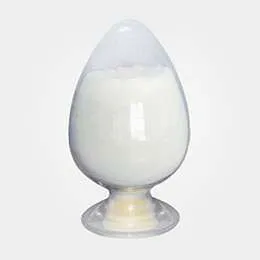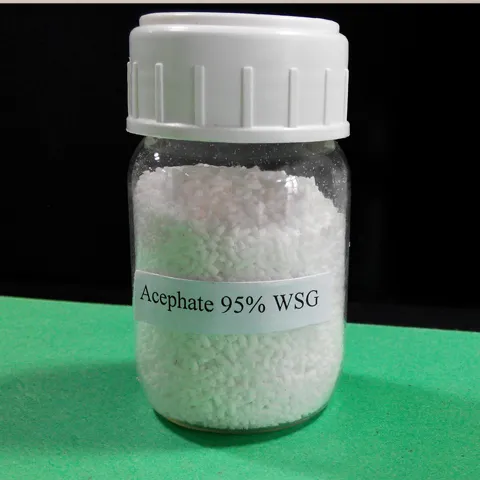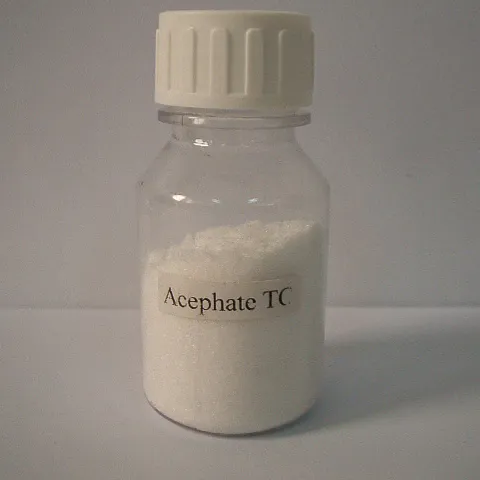


Acephate Insecticide: Systemic & Broad-Spectrum Pest Control
In the dynamic landscape of modern agriculture, effective pest management remains paramount to ensuring food security and maximizing crop yields. Among the myriad of solutions available, Acephate stands out as a highly effective organophosphate insecticide, widely recognized for its broad-spectrum control and systemic action. This comprehensive guide delves into the core aspects of Acephate, from its chemical properties and manufacturing process to its diverse application scenarios, technical advantages, and market positioning, providing insights crucial for agricultural professionals, distributors, and policymakers.
Global Trends in Pest Management and the Role of Acephate
The global agricultural industry faces constant challenges from evolving pest populations, climate change impacts, and increasing demands for sustainable farming practices. According to recent reports, the global pesticide market size was valued at approximately USD 62 billion in 2022 and is projected to reach over USD 90 billion by 2030, driven by the necessity to protect crops from significant losses that can range from 20% to 40% of potential yield without effective control measures. Within this context, insecticides like Acephate continue to play a critical role, particularly in regions where intensive agriculture is practiced. While the trend leans towards integrated pest management (IPM) strategies and biological controls, the immediate and reliable efficacy of selective chemical insecticides remains indispensable for addressing severe infestations and safeguarding economic viability for farmers.
The continued relevance of Acephate lies in its unique attributes: its systemic nature allows it to be absorbed by plants and translocated throughout the plant tissue, providing protection against sucking and chewing insects that feed on treated foliage. This characteristic offers extended residual control and is particularly effective against pests hidden within plant structures. Furthermore, its versatility across a wide range of crops and pests underpins its stable demand in the market.

Acephate: Technical Parameters and Product Specifications
Acephate is a common name for O,S-Dimethyl acetylphosphoramidothioate. It is an organophosphate insecticide that acts as a cholinesterase inhibitor, disrupting the nervous system of insects. It is primarily used to control a wide range of chewing and sucking insects, including aphids, leafminers, thrips, caterpillars, and whiteflies.
Key Technical Specifications of Acephate Technical Grade:
| Parameter | Specification | Description / Significance |
|---|---|---|
| Chemical Formula | C₄H₁₀NO₃PS | Defines its molecular structure. |
| CAS No. | 30560-19-1 | Chemical Abstracts Service Registry Number, unique identifier. |
| Purity (Technical Grade) | ≥ 97% w/w | High purity ensures efficacy and reduces impurities. Compliant with FAO/WHO specifications. |
| Appearance | White crystalline powder | Physical form of the technical grade product. |
| Melting Point | 89-91°C | Indicates thermal stability and purity. |
| Vapor Pressure | Low volatility minimizes atmospheric dispersion. | |
| Solubility in Water | 650 g/L at 20°C | High water solubility allows for various aqueous formulations (e.g., SP, WP). |
| Octanol-Water Partition Coefficient (log Kow) | -0.9 to -0.6 | Indicates hydrophilic nature, contributing to systemic action. | Mode of Action | Systemic, Contact, Stomach Action | Absorbed by plants (systemic), kills on contact, and through ingestion. |
| Toxicity (Oral LD50, Rat) | 800-1000 mg/kg | Measures acute toxicity. Acephate is classified as moderately toxic (WHO Class II or III depending on formulation). |
These parameters are critical for formulating different product types, such as Soluble Powder (SP), Wettable Powder (WP), Granules (GR), and Emulsifiable Concentrate (EC), each designed for specific application methods and crop types. The high water solubility of Acephate technical grade facilitates the creation of easy-to-mix formulations, enhancing user convenience and application efficiency.
The Meticulous Manufacturing Process of Acephate
The production of high-quality Acephate involves a complex multi-stage chemical synthesis, demanding stringent control over raw materials, reaction conditions, and purification steps. At DFChemPest, our commitment to excellence is reflected in our adherence to Good Manufacturing Practices (GMP) and ISO 9001 quality management systems, ensuring that every batch meets the highest international standards. The process focuses on achieving exceptional purity, consistency, and stability of the active ingredient.
Acephate Manufacturing Process Flow (Chemical Synthesis):
1. Raw Material Procurement & Preparation
Material Quality: Starting with high-purity intermediates such as O,S-dimethyl phosphoramidothioate and acetyl chloride. Rigorous supplier qualification and incoming material inspection are critical to prevent contaminants.
2. Acetylation Reaction
Manufacturing Process: The core reaction where O,S-dimethyl phosphoramidothioate reacts with acetyl chloride in a controlled environment to form crude Acephate. Precise temperature and pressure control are maintained to optimize yield and minimize by-products.
3. Neutralization & Washing
Purification: The reaction mixture is neutralized to remove acidic by-products, followed by multiple washing steps using demineralized water to remove inorganic salts and water-soluble impurities. This step is crucial for enhancing the purity of the crude product.
4. Crystallization
Refinement: The purified solution undergoes controlled cooling and solvent evaporation to facilitate the crystallization of Acephate. This process is meticulously monitored to ensure uniform crystal size and high purity, which impacts the final product's physical stability and solubility.
5. Centrifugation & Drying
Isolation: The Acephate crystals are separated from the mother liquor using high-speed centrifuges. Subsequently, they are dried in vacuum or fluid bed dryers under controlled conditions to remove residual moisture, ensuring the product's stability and shelf life.
6. Grinding & Micronization
Formulation Preparation: Dried Acephate technical is then finely ground or micronized to achieve the desired particle size distribution, which is essential for uniform dispersion in various formulations (SP, WP). This process involves precision grinding equipment to ensure optimal performance in agricultural sprays.
7. Quality Control & Packaging
Detection Standard: Each batch undergoes rigorous quality control checks against internal and international standards (e.g., FAO specifications, ISO 9001). This includes analytical tests for purity (HPLC), moisture content, pH, and physical parameters. Once approved, the product is securely packaged to maintain its integrity during storage and transport. Our quality assurance ensures a minimum shelf life of 2 years under proper storage conditions.
This stringent process ensures that DFChemPest delivers an Acephate product with consistent quality and high efficacy, providing farmers with a reliable tool for pest management. Our manufacturing facilities are equipped with state-of-the-art reactors, purification units, and automated control systems, minimizing human error and maximizing efficiency.
Diverse Application Scenarios of Acephate
Acephate is a highly versatile insecticide with a broad spectrum of activity against a wide range of agricultural pests. Its systemic properties make it particularly effective in controlling insects that feed on plant sap or are protected within plant tissues. Applicable across various sectors of agriculture, it is a go-to solution for many common and persistent pest challenges.

Key Applicable Industries and Crops:
- Field Crops: Widely used in cotton, soybeans, corn, and tobacco to control pests like cotton aphids, bollworms, cutworms, and soybean loopers. Its efficacy here contributes significantly to preventing yield losses in large-scale farming operations.
- Vegetables: Essential for protecting a variety of vegetables such as potatoes, tomatoes, lettuce, cabbage, and beans against aphids, leafminers, whiteflies, and various lepidopteran larvae. Acephate's systemic action ensures thorough protection, even in dense foliage.
- Fruits: Applied in fruit orchards for crops like citrus, apples, pears, and stone fruits to manage pests such as citrus aphids, codling moths, and scale insects. Its residual effect is valuable in managing multi-generational pests.
- Ornamentals & Turf: Utilized in nurseries, greenhouses, and on turfgrass to control a wide array of pests including aphids, thrips, mealybugs, and cutworms, preserving the aesthetic and health of high-value plants.
- Forestry: Sometimes employed in forest management for specific pest outbreaks affecting tree health, though typically with more targeted application methods.
Advantages of Acephate in Typical Application Scenarios:
- Systemic Action: When applied to the foliage or soil, Acephate is absorbed by the plant and translocated throughout its vascular system. This provides protection for new growth and offers control of hidden pests that are difficult to reach with contact-only insecticides. This property significantly enhances its efficiency in crops with dense canopy structures.
- Broad-Spectrum Control: Effective against a wide range of chewing and sucking insects, reducing the need for multiple different insecticides. This broad activity simplifies pest management programs for farmers.
- Translaminar Activity: Acephate can penetrate leaf surfaces and move to the underside of the leaf, providing control of pests like leafminers and aphids that feed there.
- Relatively Quick Knockdown: While systemic, it also has contact activity, providing relatively fast knockdown of exposed insects.
- Residual Efficacy: Offers a sustained period of control, reducing the frequency of applications and thus labor costs for farmers. The residual effect contributes to longer-term pest suppression.
- Compatibility with IPM: When used judiciously and according to label instructions, Acephate can be integrated into IPM programs, complementing other pest control tactics.
Technical Advantages of DFChemPest's Acephate
At DFChemPest, our dedication to research and development, coupled with rigorous quality control, positions our Acephate products at the forefront of the agrochemical market. We focus on optimizing formulation stability, biological efficacy, and user safety.
Key Technical Differentiators:
- Superior Purity: Our technical grade Acephate consistently exceeds 97% purity, minimizing inert ingredients and potential contaminants. This ensures maximum efficacy per unit applied and reduces environmental load.
- Optimized Formulations: We offer a range of highly stable formulations (SP, WP, GR, EC) tailored for specific application needs. Our Soluble Powder (SP) formulations, for example, exhibit rapid dissolution rates and minimal clogging of spray nozzles, leading to efficient and uniform spray coverage.
- Enhanced Systemic Uptake: Our formulations are designed to promote optimal systemic uptake by plants, ensuring that the active ingredient is efficiently translocated to all parts of the plant, including new growth and protected areas. This maximizes the insecticidal effect against target pests.
- Consistent Particle Size Distribution: Through advanced micronization techniques, we ensure a highly consistent and fine particle size for our solid formulations. This is critical for suspension stability in spray tanks, reducing sedimentation, and ensuring even distribution in the field.
- Rigorous Quality Control: Every batch undergoes extensive testing, including High-Performance Liquid Chromatography (HPLC) for active ingredient content, Fourier-transform infrared spectroscopy (FTIR) for structural confirmation, and accelerated storage stability tests. These robust testing protocols ensure long shelf life and consistent performance under diverse environmental conditions.
- Environmental Responsibility: While Acephate is a chemical pesticide, DFChemPest is committed to responsible manufacturing. Our processes are designed to minimize waste and reduce environmental impact, adhering to international environmental management standards like ISO 14001.
Manufacturer Comparison: Why Choose DFChemPest for Acephate?
In a competitive global market, choosing the right supplier for agrochemical inputs like Acephate is critical for sustained agricultural success. DFChemPest distinguishes itself through a blend of technical expertise, unwavering quality, and customer-centric service.
DFChemPest vs. Other Suppliers:
| Feature | DFChemPest Advantage | Typical Competitor Scenario |
|---|---|---|
| Product Purity | Consistently ≥97% Acephate; certified by third-party labs. | May vary; sometimes lower purity leading to higher application rates. |
| Formulation Stability | Excellent shelf life (2+ years) and stability in diverse climates; minimal degradation. | Variable stability; potential for degradation under adverse storage conditions. |
| Quality Certifications | ISO 9001:2015, ISO 14001:2015, OHSAS 18001; GLP-compliant testing. | May have basic certifications, but less comprehensive. |
| Technical Support | Dedicated team of agronomists and chemists for application guidance, troubleshooting, and custom solutions. | Limited or basic after-sales support. |
| Supply Chain Reliability | Robust global logistics network; strong relationships with raw material suppliers ensuring consistent supply. | Potential for supply disruptions or delays, especially for large orders. |
| R&D and Innovation | Continuous investment in optimizing synthesis processes and developing new, more efficient formulations. | Less emphasis on ongoing R&D; focus on generic production. |
| Customization Capabilities | Ability to develop bespoke formulations, concentrations, and packaging for specific market needs. | Standard product offerings with little flexibility. |
| Customer Feedback & Experience | High customer retention rates; positive testimonials from global distributors and farmers. Demonstrated 15+ years of industry service. | Mixed feedback; possibly newer to the market or less established. |
DFChemPest's commitment to verifiable standards and deep industry experience makes us a trusted partner. Our products are not just chemicals; they are solutions backed by scientific rigor and practical application knowledge.
Custom Solutions and Tailored Acephate Formulations
Understanding that different regions, crops, and pest pressures demand specific approaches, DFChemPest offers comprehensive customization services for Acephate products. Our aim is to provide solutions that precisely meet our clients' unique requirements, optimizing efficacy and cost-effectiveness.
Our Customization Capabilities Include:
- Specific Formulations: Beyond standard SP, WP, GR, and EC, we can develop custom concentrations or combinations to address particular pest management challenges or regulatory requirements. For example, specific solvent blends for ECs to improve compatibility with certain spray equipment.
- Packaging Solutions: From bulk bags for industrial clients to retail-ready smaller packs (e.g., 100g sachets, 1kg pouches, 25kg drums) with customized branding and multilingual labeling, we ensure product presentation aligns with market demands.
- Adjuvant Integration: For enhanced performance, we can incorporate specific adjuvants (e.g., wetting agents, spreaders, stickers) directly into the Acephate formulation, improving spray coverage, rainfastness, and uptake.
- Regional Adaptations: Understanding climatic variations and soil types, we can fine-tune formulations for optimal performance in diverse environmental conditions, such as formulations with enhanced UV stability for tropical climates.
- Regulatory Compliance Support: Our team provides expert guidance on regional regulatory requirements (e.g., residue limits, registration protocols), ensuring that customized products meet all local standards for market entry and use.
Our collaborative approach involves close consultation with clients, from initial concept to final product delivery, ensuring that the tailored Acephate solution delivers maximum value.
Application Cases and Customer Success Stories (Experience & Trustworthiness)
DFChemPest's Acephate has been successfully deployed in diverse agricultural settings worldwide, delivering tangible benefits to farmers and agricultural enterprises. These real-world applications underscore our product's reliability and our company's commitment to customer satisfaction.

Case Study 1: Cotton Aphid Control in Southeast Asia
A large-scale cotton farm in Vietnam faced severe infestations of cotton aphids (Aphis gossypii), leading to significant yield losses. After consulting with DFChemPest's technical team, they adopted our 75% SP Acephate formulation. The systemic action provided rapid control, with visible reduction in aphid populations within 24-48 hours post-application. The farm reported a 15% increase in marketable cotton yield compared to previous seasons and praised the ease of application and product stability, highlighting the economic advantage of using a reliable product.
Case Study 2: Leafminer Management in Greenhouse Tomatoes (Europe)
A major greenhouse tomato producer in Spain struggled with persistent infestations of tomato leafminer (Tuta absoluta). Traditional contact insecticides were proving insufficient due to the pest's protected feeding habits. Switching to DFChemPest's Acephate, applied as a foliar spray, leveraged its translaminar and systemic properties. The active ingredient penetrated the leaf tissue, reaching the larvae inside. This led to an observed 85% reduction in leafminer damage within two weeks of initial application, significantly improving fruit quality and reducing cosmetic damage, which is crucial for market value. The producer noted the minimal impact on beneficial insects when applied responsibly.
Case Study 3: Pest Control in Brazilian Soybean Farms
Brazilian soybean growers face continuous pressure from pests like soybean loopers and stink bugs. A cooperative of farms implemented DFChemPest's Acephate as part of their integrated pest management strategy. The product's broad-spectrum control effectively managed multiple pest species simultaneously. Post-application field surveys showed a substantial decrease in pest populations, leading to an average 8-10% improvement in soybean harvest quality and quantity across the participating farms. The cooperative highlighted the consistent performance and excellent technical support received from DFChemPest.
Our Trustworthiness Commitment:
- Delivery Cycle: We maintain efficient production schedules and robust logistics, typically ensuring dispatch within 7-14 business days for standard orders, with expedited options available.
- Quality Assurance: Every product comes with a Certificate of Analysis (CoA) and Material Safety Data Sheet (MSDS). Our quality system is certified under ISO 9001:2015, ensuring adherence to the highest international standards.
- Warranty Promise: We guarantee the purity and efficacy of our Acephate products for their stated shelf life when stored under recommended conditions. Any verifiable deviation from specifications is addressed promptly.
- Customer Support: Our dedicated customer service and technical support teams are available to assist with product inquiries, application advice, and problem-solving, ensuring seamless experience from order to field application.
Frequently Asked Questions (FAQ) about Acephate
-
Uncover the Benefits of Sodium ChlorateNewsJun.24,2025
-
Sodium for Sale: Your Essential ResourceNewsJun.24,2025
-
Raw Materials in Chemical IndustryNewsJun.24,2025
-
Potassium Hydroxide: Versatile Solutions for Your NeedsNewsJun.24,2025
-
Organic Pesticides and Chemical Raw Materials: Building a Sustainable FutureNewsJun.24,2025
-
Discover Premium Chlorine Tablets TodayNewsJun.24,2025
-
Zinc for Sale: Your Essential ResourceNewsJun.04,2025


















